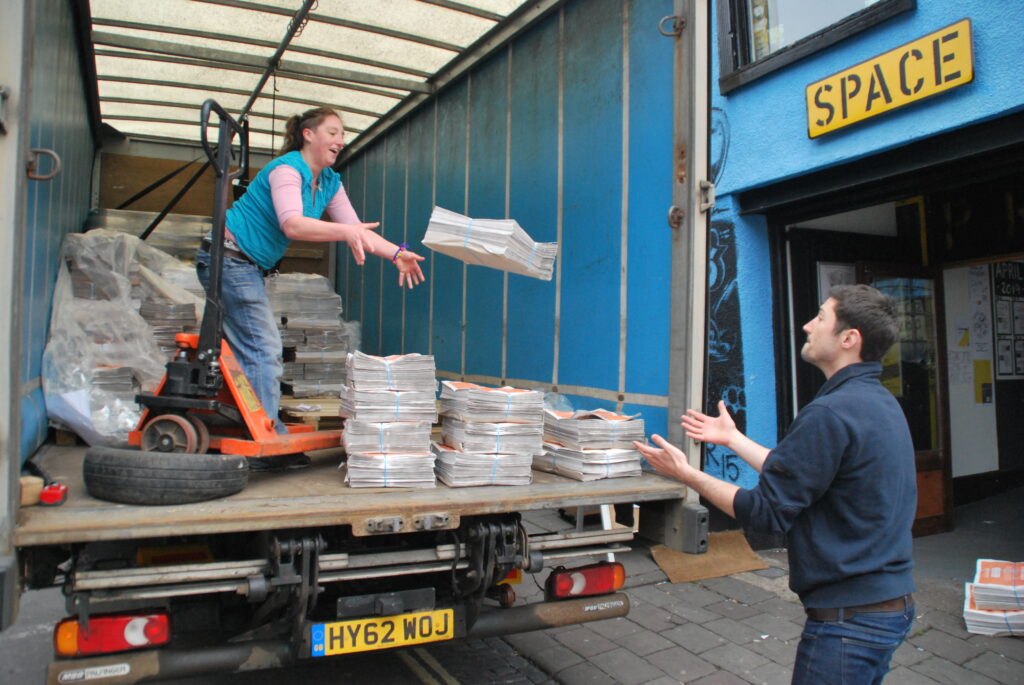Eliz Mizon of The Bristol Cable looks across the bridge for hope and inspiration about the future of public interest journalism
At the beginning of the 2020s the UK finds itself, alongside countries around the world, in a vulnerable state. We appear to be firmly down the path of an ‘era of multicrisis’, a concept not simply invented by anxiety-ridden young people on university campuses, but increasingly addressed by world leaders at global governance summits.
These crises span the environment, democracy and inequality, and hold many other themes, angles and nuances if one cares to dig deeper. But there is, arguably, one that underpins them all and, if comprehensively addressed, could respond to them all: the crisis of information.
Many of us working in the independent media sector are looking to the Welsh government, a rare investor in public interest journalism, as part of the vanguard on this issue.
‘Wales is currently leading the way in supporting public interest journalism,’ says Emma Meese, Director of Community Journalism at Cardiff University’s School of Journalism, Media and Culture. ‘Not only is the government supporting public interest journalism by facilitating a public interest journalism working group, made up of a wide range of representatives from across the industry, but it’s also providing money to support the growth and development of various publications that provide public interest news in Wales.
The news from Wales hasn’t escaped those of us championing and building a new model for independent public interest journalism across the UK – journalism that genuinely works for the average Brit. It’s not simply the offer of government funding that piques our interest, but the potential for democratising that funding and, in-turn, public interest journalism itself.
Over the last decade, a handful of independent newsrooms have launched to fill the gaps; however they are more often than not compromised by insufficient funding, limiting their ability to fulfil their democratic role effectively.
This week, two member groups of that coalition of indie media champions, the Public Interest News Foundation (PINF) and the Media Reform Coalition (MRC), with Welsh involvement via the IWA, have launched ‘Funding Journalism Using Participatory Grantmaking – A Guide. This proposal will outline how participatory grantmaking, a premise already widely used in philanthropy, could help not only better fund investigative journalism in the public interest in the UK, but also ensure that newsrooms actually meet the needs of communities all around the country.
But, could it actually work? And how exactly does it align with what’s been happening in Wales over the last few years?
The collapse of local journalism
We know that public interest journalism, as opposed to sensational, commercial, or entertainment journalism, is crucial for democracy. Public interest journalism – the kind that involves investigations, council and court reporting, and holding power to account – is the most expensive, and therefore the first to be lost when times get tough. Which they have.
The industry’s twentieth century business model, built around selling print advertising via attention-grabbing content, shifted in the twenty-first century: attention-grabbing has been streamlined and modernised (clickbait, the attention economy) and advertising revenues have been lost (to Google and Meta’s duopoly, leading to the loss of around half the news industry’s workforce by the 2010s, and Pulitzer-winning newsrooms closing).
Rebuilding a model via subscriptions and philanthropy has been difficult given public trust in journalism, particularly in the UK, is at rock bottom after decades of scandal and sensationalism. New models are only just beginning to work, and even then only for some big titles.
Australia has passed legislation requiring Big Tech giants to pay news publishers for the content that brings their platforms so many visitors, and therefore the ad sales that used to go to newspapers themselves. Canada was close behind, and the UK government is now considering this also. However, some of the biggest news proprietors in Australia (including, of course, Murdoch) were leading the charge and one year on, the process appeared not to be benefiting the smaller, independent news organisations that most need the support.
Local journalism has all but collapsed, with the UK population now suffering numerous ‘news deserts’: areas which have no local newspaper, or papers that have been ‘shelled out’ to the extent that they’re no longer fit for purpose. Over the last decade, a handful of independent newsrooms have launched to fill the gaps; however they are more often than not compromised by insufficient funding, limiting their ability to fulfil their democratic role effectively.
Like healthcare, public interest journalism is an expensive but crucial public good that functions best when it serves people, not commercial interests. Though MPs in Westminster have launched no fewer than three separate inquiries into the sustainability of journalism in the last few years, the UK Government has chosen not to implement recommendations made. The Welsh government, however, has taken some action.
Democratising non-profit journalism
In June 2023, the Welsh government announced £200,000 of new funding to support independent journalism in Wales, half of which went directly to existing newsrooms, with the other dedicated to shared initiatives and research at Cardiff University to further support the sector.
Small pots of funding from the state hardly make a journalistic utopia, though. And not everyone agrees that government directly funding news is the right approach, including Shirish Kulkarni, a member of both the Public Interest Journalism Working Group and the Expert Panel on the Devolution of Broadcasting and Communications.
Innovative. Informed. Independent.
Your support can help us make Wales better.
‘There will always be legitimate concerns around government directly funding journalism,’ he told me. ‘However, if we accept that journalism is a public good, then it makes complete sense for there to be public funding to support the systemic conditions for better, more inclusive and more effective journalism.
‘In funding exercises to map and analyse the media sector in Wales and to build expertise in economic sustainability amongst those often marginalised by the industry, the Welsh Government is offering a model of what future funding for journalism might look like.’
The money the Welsh government has put into research and sustainability for the sector will build up a critical mass of people with the right skills, particularly people from marginalised backgrounds. This is what will truly help bolster better, more diverse journalism, he says, and is where Wales is really setting the standard.
Governments have a number of direct and indirect mechanisms for supporting industries, and regarding the media industry specifically, participatory grantmaking (PGM) would be one safeguard to prevent editorial interference.
In a context where large media conglomerates dominate the landscape, there will need to be safeguards to ensure that funds go towards smaller and less well-resourced outlets, which could be achieved through having turnover thresholds as eligibility criteria.
PGM is a method used in philanthropy where grantmakers bring in citizens to decide how a pot of funding is used and distributed. It arose from a recognition that decisions shaped by donors or professional staff often end up excluding the most vital and necessary groups and projects, while channelling resources to work which is misaligned with community needs. PGM aims to distribute power as well as money, involving affected communities not just in final decision-making but in designing the overall structure and purpose of a fund.
According to the proposal launched by PINF and the MRC on 11 September 2023, PGM can be adapted for journalism funding. It’s widely accepted that new sources of funding are now required to support journalism, whether coming from the state, philanthropy or Big Tech companies; wherever it comes from, it will be far more likely to produce journalism in the public interest, that truly benefits communities, if it is subject to democratic control and accountability.
Involving citizens
A recent example that demonstrates what this could look like in practice is the Citizens’ Panel, run by the Institute of Welsh Affairs and the Open University in 2022. The aim here was to understand how news and information in the country can be improved in the era of ‘fake news’. The IWA and OU brought together 15 citizens to learn about the topic and produce a set of recommendations on media regulation, democratic and citizenship education, and recognising Welshness.
The panel was recruited using sortition, selecting according to a set of demographic targets: gender, age, ethnicity, education, geography, urban/rural, Welsh speakers, and Senedd voters. The aim was to over-recruit within demographic categories typically underrepresented in democratic deliberation processes. The group spent 19 hours together online, learning from experts in the field, deliberating on their views collectively, and then putting together their recommendations, which required 80% of the panel’s vote to be passed.
There are also existing grantmakers like Edge Fund, a UK-based funder which distributes small grants to grassroots groups, in which the decision on how much money to grant and to whom are decisions made by a selection of relevant people: those with specific expertise and experience (e.g. migrant rights, or Gypsy, Roma Traveller organisations), or previous grantees, for example.
There will be some challenges adapting PGM to journalism funding. PGM is generally framed as supporting community empowerment or building movements for social change, and while some level of profit-making may be considered acceptable, the recipient’s core purpose would need to be delivering public goods and value for communities, rather than returning profits to shareholders. In addition, in a context where large media conglomerates dominate the landscape, there will need to be safeguards to ensure that funds go towards smaller and less well-resourced outlets, which could be achieved through having turnover thresholds as eligibility criteria.
According to Emma Meese, who also runs the Independent Community News Network as part of her work at Cardiff University, a multi-million pound PGM fund for journalism would be ‘totally transformative’.
‘No matter how much money the UK Government has previously provided to support journalism, the majority of any investment in news has always ended up in the hands of the larger news publishers. We have spent far too long in the UK trying to prop up the crumbling news infrastructure that we’ve had for decades.
‘We know that communities are more connected to smaller, independent, news publishers. I’m certain this would be reflected in the allocation of funds if it was decided by citizens in a participatory way. It would give us a chance of filling the existing news black holes and slowing the rapid decline of public interest journalism.’
Perhaps, with a published guide to PGM for journalism, this goal is that little bit closer.
This week, we highlight the role of public interest journalism: why it matters, and what can be done to strengthen it.
All articles published on the welsh agenda are subject to IWA’s disclaimer. If you want to support our work tackling Wales’ key challenges, consider becoming a member.





